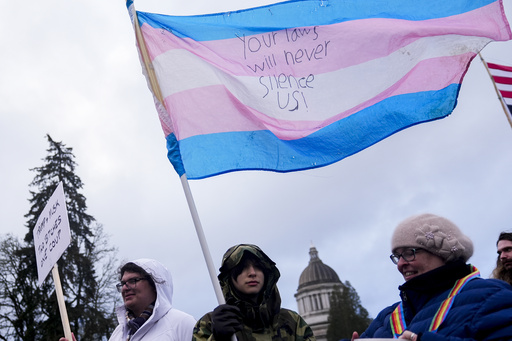A lawsuit filed on Friday by seventeen Democratic officials accuses the administration of former President Donald Trump of unlawfully pressuring healthcare providers to cease offering gender-affirming treatments to transgender youth. This legal action follows a period where numerous major hospitals in states permitting such care have announced restrictions or complete cessation of these services. The most recent announcement, as of Thursday, was made by UI Health in Chicago.
In July, the Trump administration declared that subpoenas were being issued to these providers, accompanied by a focused inquiry into potential fraud. Consequently, subsequent statements were made highlighting the reduction of treatments by several hospitals.
Democratic representatives argue that Trump’s administration aims to impose a de facto national ban on the care for individuals under 19 without any corresponding federal law prohibiting such treatments for minors. The lawsuit, initiated by fifteen state attorneys general along with the Governor of Pennsylvania, was filed in Boston’s U.S. District Court.
New York Attorney General Letitia James criticized the federal government, stating it was harassing providers offering valid medical care to transgender youth. In opposition, Trump and critics claim that the treatments lead to irreversible choices that may later be regretted and are based on dubious scientific grounds.
Since 2021, 28 Republican-led states have either banned or limited gender-affirming care for minors. Furthermore, a Supreme Court ruling in June permitted states to enforce such laws. As a consequence, families seeking care for transgender children now face significant challenges, especially as policy changes prompt urgent searches for alternative healthcare options.
In July, the Center for Transyouth Health and Development at Children’s Hospital Los Angeles, a major public center for gender-affirming care, was closed. Yale New Haven Health, UChicago Medicine, and Kaiser Permanente are among other health entities that have indicated restrictions. As of August, Kaiser Permanente, which operates across multiple states including California, suspended surgeries for those under 19 but continues hormone therapy.
Connecticut Children’s Medical Center referenced the “complex and evolving landscape” as a reason for reducing services, and other institutions like Penn State made similar decisions since the return of Trump’s administration in January.
GLMA’s executive director Alex Sheldon noted that health systems have limited services due to legal concerns, not medical reasons. Sheldon remarked that no healthcare establishment had attributed cessation to the lack of medical validity.
The Trump administration has actively taken measures against gender-affirming care in numerous capacities. Trump’s campaign last year frequently highlighted issues concerning transgender individuals, underscoring a resistance within conservative circles regarding heightened acceptance and visibility of transgender rights in society. Actions criticized gender-affirming healthcare, participation of transgender women in female sports, and the use of gender-specific facilities, notably restrooms.
In January, Trump enacted an executive order redefining governmental recognition of gender strictly as male or female, catalyzing subsequent policy changes affecting transgender rights. Additionally, he advocated ending federal funding, including Medicaid, for gender-affirming care for persons under 19. Despite an AP-NORC poll suggesting about half of U.S. adults endorse Trump’s handling of transgender issues, the American Medical Association opposes restrictions limiting access to gender-affirming medical services.
Gender-affirming care encapsulates both medical and psychological services supporting an individual’s gender identity contrary to their assigned sex at birth and incorporates counseling, puberty blockers, hormone treatments, and, less frequently, surgery for minors.
In March, a judge temporarily halted enforcement of the restriction on federal spending for such treatments, though federal actions continued. By April, through directives from Attorney General Pam Bondi, government probes targeted ongoing providers of transgender youth care.
A May report by the Department of Health and Human Services advised against medical interventions in favor of exclusive talk therapy, challenging adolescents’ understanding of the enduring treatments, including potential infertility concerns. The report, receiving significant backlash from LGBTQ+ advocates, lacked clear authorship.
The Justice Department emphasized investigating providers of gender-affirming treatments in June. By July, over 20 subpoenas were sent to implicated medical professionals and clinics concerning possible healthcare fraud and misstatements.
In a recent statement, the White House lauded decisions to discontinue gender-affirming care, condemning it as a “barbaric, pseudoscientific practice.”
Families of transgender youth, such as Kirsten Salvatore from Pennsylvania, face significant difficulties acquiring care. Salvatore’s child, benefiting from hormone therapy, feared potential detransitioning post-treatment cessation by the current provider. Amid failed attempts to locate accessible alternatives covered by Medicaid, the family’s hormone supply will only last until January. Salvatore expressed frustration over navigating these challenges with inadequate guidance and resources.


